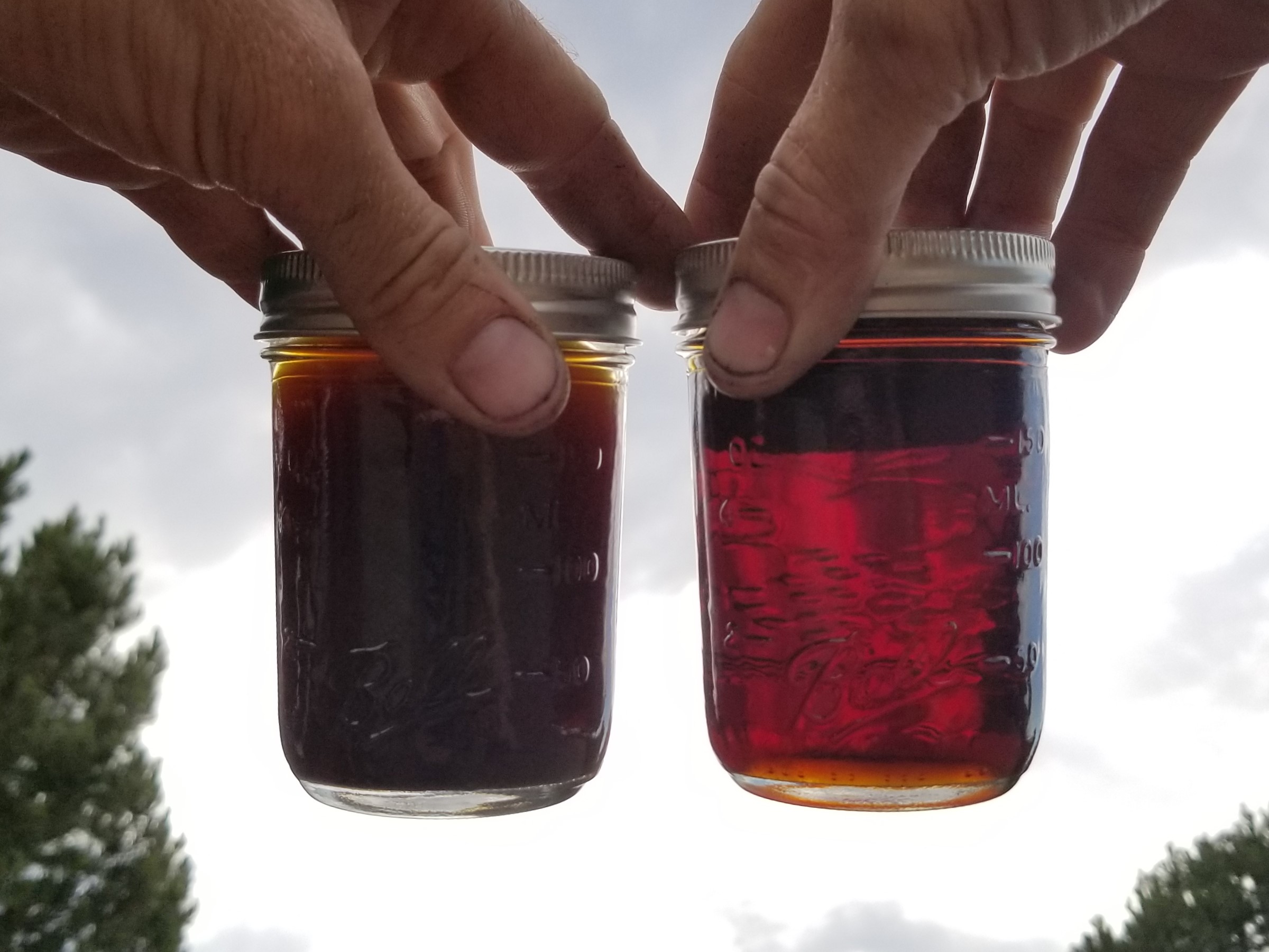Fuel Polishing
The jar on the left shows a sample from the bottom of a tank with sediment and water on the bottom, a layer of bacteria and debris in the middle, and old fuel with more particulate matter on top. The sample on the right is from the bottom of the same tank after fuel polishing.
These before and after fuel polishing samples show fuel >7 years old (dyed red for off-road use). There wasn't any free water in this tank, but just the amount of particulate matter made it look more like mud than fuel prior to polishing!
WHY FUEL POLISHING IS NECESSARY
The importance of diesel fuel management can not be understated! Contaminated fuel is the leading cause of most engine failures. Since many diesel engines are only used as a back up (such as generators, fire pumps, etc), they do not go through fuel frequently and it sits unused in storage tanks for what can be months to years.
Diesel fuel that sits unused, like any organic liquid, is inherently unstable and will degrade overtime. Three main factors responsible for this are oxidation, microorganism growth, and corrosion. Oxidation causes discoloration, water accumulation, and formation of particulate matter. Microorganisms such as bacteria and fungi will accumulate and consume the fuel producing more water and acid. In addition, they will contribute to corrosion which destroys the storage tank walls and releases metals back into the fuel. In-organic debris, such as dirt and rust, as well as organic forms of particulate matter from degradation, such as the asphalt in the fuel, can form a sediment and what is referred to as "sludge" in your tank. These bi-products are damaging to your engines in several ways. Particulate matter is abrasive to the fuel system, especially the injectors, and also leads to clogged filters. Water is a catalyst for many problems that can destroy engine components and contribute to further corrosion in injectors, pumps, tanks, etc.
Incomplete combustion is another problem with contaminated fuel which leads to an increase of carbon buildup, exhaust gas temperatures, emissions, and fuel consumption. This secondary buildup in the exhaust system along with increased temperatures is a fire hazard.
Fuel polishing is more important today than ever. Sulfur in diesel fuel adds lubrication to the fuel and slows the degradation process, but regulations were put in place in 2007 to remove most sulfur from diesel fuel. In addition, the new tier 4 emissions requirements have made engines much more susceptible to damage from contaminated fuel.
It is important to address all aspects of this fuel breakdown. If only one problem is addressed, for example, when biocide fuel additives are recommended alone, they will help control the microbial activity, however, they will not address the sludge/tank buildup, water accumulation, etc and can actually contribute to the problem by turning bio-film into additional solid matter in the tank. Ultimately, this will clog fuel filters and lead to more frequent filter replacement.
Fuel testing (sampling from the BOTTOM of the tank) is not only recommended annually, but is required by organizations like the the NFPA and The Joint Commission for stored fuel used for equipment such as fire pumps, hospital back up generators, etc. If testing shows significant contamination or degradation, fuel polishing is used to restore the fuel to required specifications.
For more information you can visit AXI International, a leading company in fuel management by clicking here.
HOW FUEL POLISHING WORKS
Fuel Polishing ideally involves, first, testing a fuel sample to see what problems really need to be addressed. Different fuel additives can be applied to help kill microbes, loosen adhered contaminants from the fuel system, add lubrication, prevent gelling in cold temperatures, and provide stabilization to help slow further degradation for up to 12 months. The fuel is then run through a system of various sized filters and a magnetic fuel conditioner to remove particulate, water, address microbial contamination and put the asphalt portion of the fuel back into solution. In our dry climate, it is recommended that fuel be polished every 12 months (in very humid areas, it may need to be done every 4-6 months).
The end result prevents clogged filters; provides peak engine performance; extends the life of engines, injectors, and fuel; saves money; and increases safety and reliability.
Having reliable backup electrical power or water pumped in case of fire is too important to leave to chance, so taking care of your fuel is of utmost importance. We are proud to work with AXI International products and equipment as well as Titan Laboratories to provide you with the best fuel management possible. Contact us to set up an appointment to have your fuel tested and polished today!




